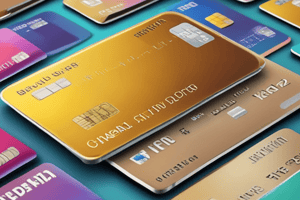Podcast
Questions and Answers
What type of interest is typically the highest on a credit card when the minimum monthly payment is not made?
What type of interest is typically the highest on a credit card when the minimum monthly payment is not made?
- Variable interest
- Fixed interest
- Promotional interest
- Revolving interest (correct)
Which scenario is least likely to help avoid interest charges on a credit card?
Which scenario is least likely to help avoid interest charges on a credit card?
- Using installments or advances regularly (correct)
- Ensuring payments are made consistently each month
- Paying in full on or before the payment deadline
- Timing payments according to the billing date
What is a common requirement for avoiding maintenance fees on most credit cards?
What is a common requirement for avoiding maintenance fees on most credit cards?
- Using the card at least five times a month
- Accumulating a specific number of points
- Meeting minimum spending thresholds
- All of the above (correct)
What is the status of maintenance fees for credit cards such as Rapicard and Tempo card?
What is the status of maintenance fees for credit cards such as Rapicard and Tempo card?
Which of the following could lead to additional interest charges besides the regular interest?
Which of the following could lead to additional interest charges besides the regular interest?
What distinguishes a credit card from a debit card in terms of usage?
What distinguishes a credit card from a debit card in terms of usage?
What is the maximum date for repaying the total amount spent within a billing period generally referred to as?
What is the maximum date for repaying the total amount spent within a billing period generally referred to as?
Which cost is typically associated with credit cards but not with debit cards?
Which cost is typically associated with credit cards but not with debit cards?
How do credit cards generally allow consumers to handle larger purchases?
How do credit cards generally allow consumers to handle larger purchases?
What is a common promotional incentive offered by some financial institutions for credit cards?
What is a common promotional incentive offered by some financial institutions for credit cards?
What additional fee may be applied to credit cards not linked to current accounts?
What additional fee may be applied to credit cards not linked to current accounts?
What should one consider before using credit card advances?
What should one consider before using credit card advances?
Which of the following statements about rewards and loyalty programs is accurate?
Which of the following statements about rewards and loyalty programs is accurate?
Flashcards
What is a credit card?
What is a credit card?
A card that allows you to borrow money from the issuing institution up to a specific limit.
What is a debit card?
What is a debit card?
A card that lets you spend money directly from your bank account.
What is a credit limit?
What is a credit limit?
The maximum amount of money you can borrow using your credit card.
What is a billing period?
What is a billing period?
Signup and view all the flashcards
What is a payment deadline?
What is a payment deadline?
Signup and view all the flashcards
What is installment payment?
What is installment payment?
Signup and view all the flashcards
What is a credit card maintenance fee?
What is a credit card maintenance fee?
Signup and view all the flashcards
What is a credit card advance?
What is a credit card advance?
Signup and view all the flashcards
Revolving Interest
Revolving Interest
Signup and view all the flashcards
Credit Card Maintenance Fee
Credit Card Maintenance Fee
Signup and view all the flashcards
Credit Card Installment
Credit Card Installment
Signup and view all the flashcards
Late Payment Fees
Late Payment Fees
Signup and view all the flashcards
Credit Card Advance
Credit Card Advance
Signup and view all the flashcards
Study Notes
What is a credit card and how does it differ from a debit card?
- Credit cards use borrowed money from the issuing bank, called a credit limit.
- Debit cards use funds from a linked bank account.
- Credit cards have a billing cycle with a cut-off date and a payment due date, usually 10-15 days after the cut-off.
- A billing period combines all credit card activity for a set period.
- The payment due date is the deadline to repay the total amount charged within the billing period.
- Credit cards allow installment payments to divide purchases into monthly amounts.
- Debit cards rarely offer rewards like points, miles, or cashback, with a few exceptions, unlike credit cards.
- Credit cards often have more extensive loyalty programs with higher reward amounts.
- Credit cards usually provide a wider array of discounts and benefits.
Credit Card Costs
- Credit cards have costs not typically found with debit cards.
- A monthly maintenance fee varies by card and issuer, ranging from free to over 20,000 pesos.
- Some cards are free; others may charge additional fees quarterly, annually, or semi-annually. Interest is applied to installments.
- Interest charges vary by institution. The National Credit Association (CNAC) provides tools to compare interest rates.
- Some institutions offer promotional interest-free installment periods—three, six, or 12 months are common examples.
- Installment payments may have a stamp tax, except for certain 'cash payment' options (not the same as interest-free installments) or cards from cooperatives.
- Credit card advances, borrowing cash directly or using an ATM, accrue interest and taxes.
- Avoid credit card advances unless investments earn more than the interest charged.
- Interest rates differ for installments, advances, minimum payments, and partial repayment.
- Revolving interest, for failing to pay the minimum monthly payment, tends to be the highest rate charged.
- Late payments and debt collection may involve additional interest charges depending on the outstanding balance.
Avoiding Credit Card Costs
- Avoiding credit card maintenance fees is often difficult, as conditions like minimum spending, points accumulation, or usage frequency are common requirements.
- Most credit cards require the fee regardless of use unless under specific terms like Rapicard or Tempo card which have no maintenance fee conditions.
- Pay in full and by the payment deadline to avoid interest charges.
- Understanding your billing cycle, including the cut-off date and payment due date, is crucial.
- Only certain credit cards, such as Rapicard and Tempo card, are exempt from maintenance fees without usage requirements.
Studying That Suits You
Use AI to generate personalized quizzes and flashcards to suit your learning preferences.




